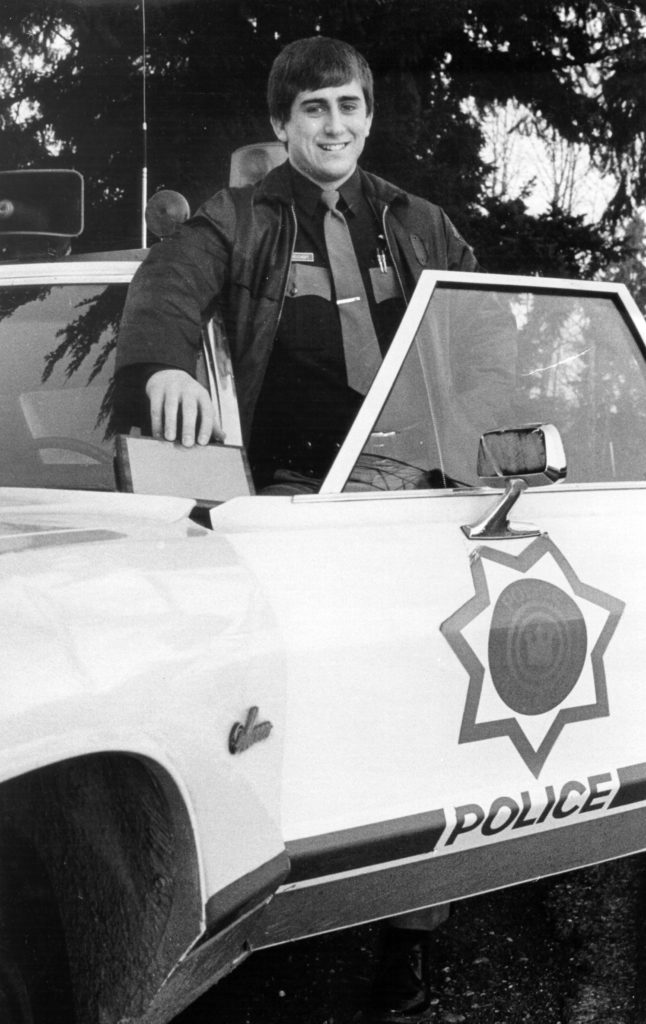This Former Sheriff Is Leading the GOP’s Response to Policing ‘Crisis’ in America
Josh Siegel /
Rep. Dave Reichert is quick to let you know why he has the life experiences to be the GOP’s authority on addressing historic tensions between the police and the people they serve.
“I have been there before, where your life is threatened and you have to make a split decision,” said Reichert, R-Wash. “I have been in battles where my throat has been slashed with a butcher knife, where I had a shotgun stuck to my belly, and each time I was able to resolve the situation without using force.”
In a 33-year law enforcement career, Reichert, 65, was a model for policing at its finest, gaining national recognition when he was sheriff of King County in Washington state by overseeing the capture of one of the most notorious serial killers in U.S. history.
But despite his respect for policing, and his success as a participant in it, Reichert says he recognizes a need for reform, and he is calling on Congress to take action.
After a dizzying series of events last month involving law enforcement fatally shooting citizens, and police officers being murdered in ambush attacks, Reichert approached House Republican leaders with a plan.
He pitched the idea of transforming a law enforcement task force he had chaired for the past year into a bipartisan working group dedicated to “having a candid discussion on issues fueling excessive force by law enforcement and against police officers.”
In July, House members announced the new working group, replacing the Republican Policy Committee Law Enforcement Task Force that only had GOP members.
“The old cop is coming out here, so excuse my language, but you can’t get s— done until you have rope on both sides trying to figure this c— out,” Reichert told The Daily Signal over two recent interviews. “We need to put some effort together to show Congress is trying to understand what is happening in this country.”
‘In a Crisis’
The working group is officially led by Reps. Bob Goodlatte, R-Va., and John Conyers, D-Mich.—the leaders of the Judiciary Committee.
Along with Reichert, other members include: Republican Reps. Trey Gowdy of South Carolina, Doug Collins of Georgia, Susan Brooks of Indiana, and Will Hurd of Texas; Democratic Reps. Sheila Jackson Lee of Texas, Hakeem Jeffries of New York, Cedric Richmond of Louisiana, Keith Ellison of Minnesota, and Robin Kelly of Illinois.
Reichert says the primary focus of the working group will be to support programs and policies that encourage better training standards and stronger hiring practices to prevent violent police-citizen confrontations.
“Obviously there are problems with the way we are policing in the United States,” Reichert said. “This is not the case in every community, but it’s true in a lot of communities across the country. I think most police chiefs and sheriffs would tell you a lot of the communities they serve are in a crisis.”
In advocating for Congress to take a more hands-on approach to policing, Reichert, a sixth-term moderate, hopes his credibility brings comfort to Republicans who fear alienating cops, and who usually take a hands-off approach to handling hostility between police and minorities.

Rep. Dave Reichert, R-Wash., then the sheriff of King County in Washington state, composes himself during a press conference in 2003 after Gary Ridgway plead guilty to the infamous “Green River” murders. (Photo: Kevin P. Casey/EPA/Newscom)
Reichert’s colleagues respect his unique perspective.
“Dave is uniquely qualified to contribute to this working group,” House Speaker Paul Ryan, R-Wis., told The Daily Signal in a statement. “His service as a cop and sheriff is nothing short of legendary. Beyond that, this issue simply matters to him, and I know he’ll add a lot to the national discussion on policing.”
Reichert says the division is too great for Congress to ignore. He’s especially concerned with the rising number of police departments that have been forced to undertake consent decrees with the federal government requiring them to improve training and practices under court supervision.
Last week, the Justice Department’s Civil Rights Division released a report finding that the Baltimore Police Department has a “pattern of making unconstitutional stops, searches, and arrests” against black residents for “minor, highly discretionary offenses.”
The department must now negotiate a settlement to overhaul its practices.
Support ‘Successful’ Programs
To head off these problems, one of Reichert’s main priorities, he says, is to try and boost funding to federal grant programs that support police departments striving to build strong community ties. Critics of “zero-tolerance” policing strategies, where departments such as Baltimore focus on enforcing small violations to prevent bigger crimes, say they are a leading source of community distrust.
Reichert wants to give more money to the Justice Department’s Community Oriented Policing Services office, which awards grants to police departments and sheriffs’ offices that adopt innovative community policing strategies meant to enshrine the concept that officers build trust with the public by being visible and empathetic to neighborhood needs.
Reichert also notes the grant program’s role in financially supporting localities that deploy school resource officers, who he says are effective in combating drug use, violence, and gang activity amongst students.
Reichert says Congress appropriated $4 million to the community services office this year, compared to the $130 million in funding the grant program received in 2009.
“One of the things we know and we have seen in the past is that when people are frustrated economically, and when they see there is no hope for the future, and they see other people moving forward with their lives and they seem to be stuck, that breeds tension and frustration and it can blow up,” Reichert said. “A lot of times, that happens in minority neighborhoods. And that’s where community policing can play a role. Because you are law enforcement and in neighborhoods 24/7, you can be the conduit to connect people with the services they need to be successful.”
To further assist communities plagued by violence, Reichert says he’s working with congressional appropriators to reserve more money to another Justice Department program called Project Safe Neighborhoods. The program, established in 2001 with support from President George W. Bush, helps local jurisdictions reduce gun violence.
Among other things, the program provides funding to hire federal and state prosecutors to help them convict those who commit gun crimes; supports the training of officers so they can better collect evidence associated with gun crimes; and promotes community outreach efforts to to root out gang violence.
When he was sheriff in King County, Reichert says his was the first sheriff’s office to participate in the program, and he credits it with helping reduce crime there.
While Project Safe Neighborhoods has awarded $2 billion in funds during its lifetime, Reichert says Congress appropriated $4 million to it this year. He’s working with House leadership and appropriators on a bill that would set aside more money—potentially $20 million.
The National Rifle Association, which did not respond to The Daily Signal’s requests for comment, has historically been a strong supporter of the initiative.
“The NRA, like we as Republicans, want law-abiding citizens to be able to buy their guns and carry their guns in a safe and responsible way, but they don’t want to see people who have illegal possession of weapons committing crimes with guns,” Reichert said.
One thing Reichert promises the working group won’t address: gun control. Reichert argues that mandating stronger regulations of gun purchases is an inappropriate response to a complex problem.
“That’s the wrong discussion to have,” Reichert said. “It’s not the weapon being used that’s causing people to act violently. Gun control is not the answer to our social problems, and to the issue of mental health illness.”
‘All About Us’
Speaking more broadly about policing, Reichert encourages law enforcement agencies to be more selective with who they hire, even as police departments face greater scrutiny and struggle to find recruits interested in the job.
“Reform has to start first with who you hire,” Reichert said. “You should be looking for a person interested in serving the community who has the heart of a servant, who is not just out there for the action and the battle. To become an effective police officer, you have to make the right split decisions, which are life or death, and you need to have a patient personality and be willing to communicate.”

Rep. Dave Reichert, R-Wash., is pictured during his policing days in the early 1970s when he was a patrol officer. (Photo courtesy of Reichert)
In addition, Reichert says police departments should implement a procedure he used in King County where civilians are included in the hiring process, and given a say in determining punishment for officers.
“You have to bring confidence and certainty back into the community,” Reichert said. “You have to give the citizen some skin in the game. Once you open the doors, they understand why we do what we do as law enforcement, and it’s not us vs. them but all about us.”
Yet Reichert also challenges frustrated citizens to respect the police, and says law enforcement professionals have a right to protect themselves.
“Education on both sides has to occur,” Reichert said. “The first thing you have to do is make it clear that it’s not right to assault a police officer, shoot an officer, or kill an officer,” Reichert said. “If you think that’s the answer to the social problems we are experiencing right now, you are going to jail. You can’t accept that.”
Last year, after two New York Police Department officers were killed, Reichert sponsored legislation requiring instant nationwide “Blue Alerts” to warn about threats to police officers and help find those suspected of carrying them out. Reichert was in the Oval Office with the families of the victims, Rafael Ramos and Wenjian Liu, when President Barack Obama signed the bill into law.
‘Try to Understand’
Asked about other policy issues related to policing in America today, Reichert said the decision on whether jurisdictions adopt body cameras—and the procedures guiding such programs—should occur at the local level. Though police departments are increasingly embracing body cameras as a way to document forceful interactions between officers and the public, Reichert warns about their limitations.
“One of the problems with body cameras is we have gotten to the point where we are only trusting each other because we record each other’s actions, rather than I trust you, let’s work together,” Reichert said. “Instead, it’s screw the relationship and I’ll video everything you do and then we all go to court and protest and throw rocks at each other.”
Reichert, and other members of the working group, say they hope the working group’s findings inform the House’s efforts in reforming the criminal justice system—an issue they see as related to the challenges with policing today.
Goodlatte and the Judiciary Committee are spearheading the criminal justice reform task force.
“My goal for this working group is to facilitate candid, frank conversations to understand the different perspectives of our criminal justice system,” said Gowdy, a Republican member of the police working group and Judiciary Committee, in a statement to The Daily Signal. “Then, we can begin to discuss potential legislative remedies. Trusting the impartiality of the justice system is essential to communities trusting law enforcement. If there is a two-tracked justice system, trust within minority communities diminishes.”
But policy aside, more than anything, Reichert wants his colleagues in Congress to gain an understanding of the tensions felt at the community level, and to empathize with experiences that might not match their own.
Before summer recess, the working group’s members sent each other off with a homework assignment.
“We wanted them to go home and talk with local community leaders, talk with someone who has had negative experiences with law enforcement, talk with young African-American males to hear about their interactions with police, talk with officers, ride along with patrol cops, and try to understand what the heck is going on here,” Reichert said.
Jackson Lee, a Democratic member of the working group, told The Daily Signal in an interview that she considers Reichert to be genuinely committed to learning about the divide between police and minority communities, and using his expertise to build shared respect.
“Part of the success with this [working group] will be for people to allow their hearts to be impacted by the stories and the facts and the words of the community, as well be concerned with law enforcement and their families, and their safety and security,” said Jackson Lee, who is a former municipal judge.
“Congressman Reichert has that kind of heart,” Jackson Lee added. “He is a wounded law enforcement officer, he was the officer who successfully found a serial killer, so he knows danger, but I think he also knows we need to have empathy and sympathy to really get at the root of the divide in the community, particularly as it affects minorities.”
After more than a decade in Congress, Reichert is far removed from his storied law enforcement career. But he’s still drawn to service, and right now his mission calls for him to make things right with policing in America.
“If I was 21 again, I would join up with the sheriff’s office again in a heartbeat,” Reichert said. “I love the job. It can be dangerous, but more often than not, it is satisfying. You have the opportunity to interact with the public in a positive way. The whole thing is you are there to protect the community and you want to get home to your family safely. That’s the job. As part of the job, you need to be engaged with the community so they can protect you and then everyone can come home safe.”



